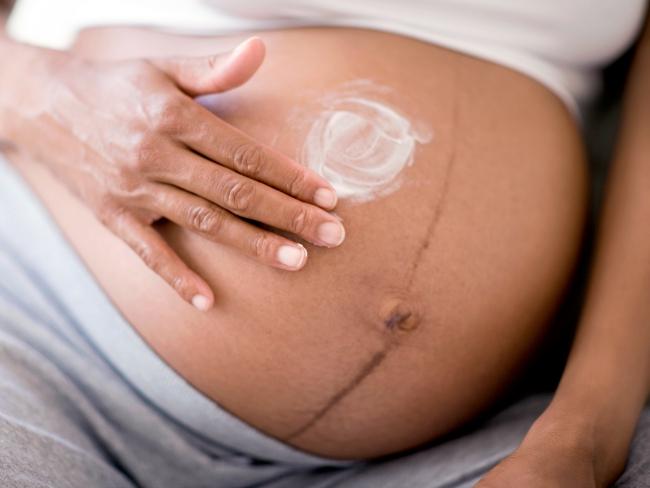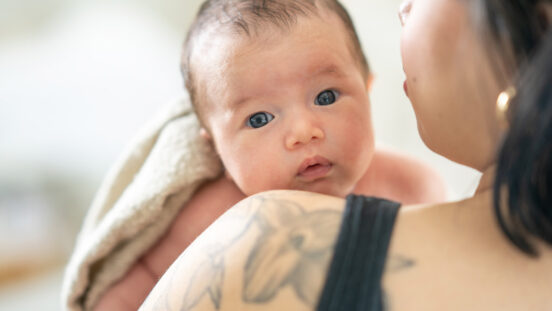Skin changes to expect while you’re pregnant

From blemishes to breakouts, itchiness to stretch marks, we explain it all.
Has your skin broken out in strange pimples and rashes now you're pregnant? Here's why its happening and what you can do about it.
You've had spots in your teens and thought the days of having to worry about pimples were well and truly over, right? Wrong!
Now you're pregnant, you may be prone to breakouts and unsightly rashes. It's all those pregnancy hormones creating havoc with your skin's delicate balance. But don't panic, pregnancy skin problems are perfectly normal and there are a few things you can try to make yourself look and feel better.
Breaking out
During your first trimester, you may find your skin changes and becomes drier and more sensitive. Or it could go to the other extreme and become greasy and spotty.
Use a cleanser and toner that's mild and nourishing, and although it may be tempting to wash your face more often when you have spots, only wash it once or twice a day to prevent drying it out.
Don't be tempted to treat pregnancy pimples with prescription acne medications as these can affect your unborn baby's development. And avoid over-the-counter cleansers and moisturisers that contain chemical exfoliants, as they'll be too strong for your skin.
Speak to a dermatologist if you need help deciding which products to use. If you're really worried, speak to your GP who can refer you to a dermatologist.
Sun sensitive
Your skin can become more sensitive to UVA/UVB rays when you're pregnant, so take care as you may burn more easily. Avoid sunbaking if you're going on holiday and cover-up your body with long, loose clothes so the rays don't penetrate your skin.
Pregnancy can also trigger an over production of pigment cells, which can cause blotchiness, so use a moisturiser with at least SPF15 even on an overcast, wintry day.
You might also notice that your moles, freckles and nipples become much darker and more noticeable now that you're pregnant. This is nothing to worry about and should fade again once you've had your baby.
A dark line (called 'linea nigra') can also appear on your abdomen (running straight down from the belly button). And many women also suffer from chloasma often called 'the mask of pregnancy' a mild darkening of the skin on the face.
These skin conditions will usually disappear within a few months after you've had your baby.
Stop scratching
Is dry, itchy skin driving you mad? Although it's frustrating, remember that every drop of moisture in your skin is sucked up to carry nutrients through your blood to your baby. Therefore, your best defence is to drink at least eight glasses of water a day as it helps hydrate your skin from the inside out.
If you're severely itchy all the time, seek medical help straight away. You may have obstetric cholestasis, a rare condition that affects your liver and kidneys and can also harm your baby.
Stretchmarks
The thing most women dread during pregnancy is stretch marks. They're likely to appear on your breasts, tummy and thighs in the second trimester, when elastic tissue in the skin stretches and breaks. They look red at first and then fade to a silver-grey. Stretch marks run in the family, so if your mum had them, you'll probably get them too.
Don't worry too much, though most skin disorders disappear after the baby's born so you won't be stuck like that forever! In rare cases, however, skin conditions, such as papular dermatitis of pregnancy, can cause harm to your baby, so it's important to see your GP if you notice anything that seems abnormal.
Most skin problems don't cause any real damage, and you'll realise they were worth going through when you finally meet your baby.
When it's more serious
Pruritic urticarial papules and plaques of pregnancy (PUPPP):
A rash of raised spots or bumps that itch. They start on the abdomen and spread to the thighs at about 34 weeks but will disappear after the birth. Recent studies suggest this it may be caused by the foetus's cells invading the mum's skin in pregnancy. This condition causes no long-term harm to the mother or baby and can be treated with corticosteroids, which must be prescribed by a doctor.
Papular dermatitis of pregnancy:
An itchy rash, which can appear all over the body, consisting of red, raised spots that look like insect bites. It occurs anytime during pregnancy and is triggered by abnormal blood levels and fluctuating hormone levels. It won't cause any complications for you, but can harm your baby if left untreated.
Feed your skin
Your baby will be absorbing many of the nutrients you're eating and you need to make sure you have enough left for your own needs. But the good news is that, during pregnancy, you become more efficient at absorbing nutrients into the digestive system.




